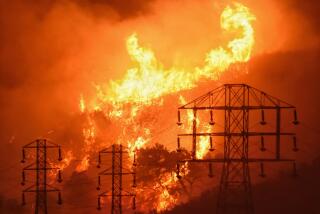Oops, There Goes Another Octopus . . .
- Share via
One way to get a fix on what’s current in California is to fly the shuttle runs between Los Angeles and San Francisco. For a while it seemed almost all the seats were taken by consultants engaged in the business of breaking up Ma Bell. They’d spend the hour in friendly debate over who offered the lowest rates--and who carried the tiniest cell phone.
After the Northridge earthquake, the jetliners filled with contractors and structural engineers, and the talk was of reinforced foundations, nail patterns and the vagaries of dealing with disaster bureaucracies. And now it’s energy deregulation.
Last week I found myself squeezed between consultants headed south for last-minute meetings on how to break down and reassemble the big power utilities. On Jan. 1, generation of electrical power in California is scheduled to become a free, unfettered enterprise, and the state’s $23-billion energy industry will have gone the way of the telephone and airline trades--another octopus hacked down to size, deregulated.
What will come of this historic shift? Well, that’s the fun of it. Nobody seems to know exactly what to expect. “There are,” as one of my seatmates said, “a lot of unanswered questions.”
*
One of the first might be: Why are we doing this? The free market is a marvelous thing, theoretically holding out the promise of expanded consumer choice, of prices whittled down by competition. And yet electrical power, like water, is not just any product. Beyond price and choice, there is reliability to consider. Turn a faucet: water. Flip a switch: lights. Thank you for the miracle, and send the bill at month’s end.
So again, where’s the wisdom in fixing something that appeared not to be broken? Well, monopolies die when the technology that created them becomes outdated. Better conservation methods and new ways to create energy, such as cogeneration, essentially eliminated the need for more huge, enormously expensive power plants--projects logically undertaken by the regulated utilities.
Also, the utilities historically overplayed their hand, making themselves easy political targets for environmentalists and consumer activists. Electrical rates in California are almost double those found in other Western states. And finally, big businesses determined they could save big money by bolting the utilities for a free market. They tapped their friends, the politicians, and in a few quick years--by Sacramento standards, a lightning strike--deregulation was a done deal.
So here we are, with all these dangling questions: Will the windfall enjoyed by industry, which can buy the cheapest power in bulk, find its way to low-income consumers with no real leverage? Will revenue-conscious energy suppliers be driven to pull the plug with dispatch on late-paying poor people, now protected by regulation? If big users pay substantially less, doesn’t it follow that someone--yes, citizen-consumer, you--winds up paying substantially more?
Will Californians revolt as they discover that almost half their bill will be going to pay off the utilities for power plants that did not pencil out? Incredibly, they also will be paying off bonds floated in order to finance an initial 10% rate decrease that’s part of the deregulation package: In other words, the consumer rate reduction will be underwritten by the same consumers. How’s that sound?
*
If power becomes cheaper, will conservation efforts decline? Under deregulation there will be options for purchasing so-called green power from wind farms and the like, but at steeper prices: How will environmentalism fare in the open market? Can wind and solar compete with cheap coal and oil?
With stiffer competition, will power producers be compelled to cut corners? Already PG&E; has discussed laying off more than half the staff serving its twin-reactor Diablo Canyon nuclear plant on the Central Coast. Now there are environments in the working world where lean-and-mean seems a natural enough fit, but is a nuclear plant one of them? I’d add aircraft ground operations to the list, as well, but that’s another deregulation story.
Will the mechanics work? Transmission remains the responsibility of the utilities, and it seems a safe bet the grid won’t miss a beat. But there are other considerations. When Britain deregulated energy, there was a breakdown in the billing procedures. Lots of Brits went months without having to pay for energy. Will Californians be so lucky?
These were the sorts of questions the consultants raised as we flew the California coast--in a hopelessly packed aircraft, knees shoved almost to our chests, elbows pinned to our ribs, and with each of us having paid $180 for a round trip that, in a more glorious day, cost something like $16. Ah, but that was before we got smart and deregulated the airlines.
More to Read
Inside the business of entertainment
The Wide Shot brings you news, analysis and insights on everything from streaming wars to production — and what it all means for the future.
You may occasionally receive promotional content from the Los Angeles Times.











